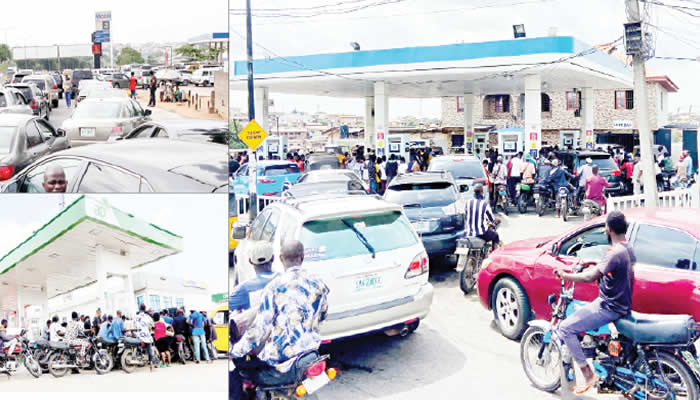Despite assurances from the Nigerian National Petroleum Corporation (NNPC) that logistical issues causing fuel scarcity had been resolved, Nigerians in Lagos and other parts of the country continue to face challenges in accessing Premium Motor Spirit (PMS) as many filling stations remain closed.
The situation has been exacerbated by a directive from NNPC to prioritize fuel truck deliveries to the Federal Capital Territory, Abuja, before other regions, leading to shortages in Lagos and parts of the South-West like Ogun, Oyo, and Osun.
Oil sector sources reveal that hundreds of trucks loaded on Saturday were sent to Abuja, leaving other regions with limited supply. NNPC has also reduced fuel allocation to depots, further exacerbating the scarcity.
An operator cited NNPC’s inability to import enough fuel currently as a major factor contributing to the erratic supply. The situation is worsened by disruptions in importation and logistical challenges.
The Independent Petroleum Marketers Association of Nigeria expressed hope that the situation would improve by midweek, but queues and shortages are expected to persist, especially in Abuja due to its distance from Lagos.
NNPC spokesperson refuted claims of rationing PMS supply and prioritizing Abuja, stating that products need to be distributed to states, denying any deliberate diversion of fuel.
The scarcity has led to long queues, fuel price hikes, and a thriving black market across several states. In Ogun State, residents have been facing fuel scarcity since last week, with prices reaching as high as N900 per liter in some areas.
Similar situations are observed in other states like Osun, Ekiti, Sokoto, and Kaduna, where black marketers are taking advantage of the shortage to extort desperate buyers.
Transportation has been severely affected, with increased fares and reduced vehicle availability. Commuters face difficulties in accessing public transportation due to the scarcity.
While NNPC claims to have resolved logistical issues, the situation remains challenging for retailers and consumers, with many filling stations still closed or operating at limited capacity.
The fuel crisis underscores the ongoing challenges in Nigeria’s petroleum sector, highlighting the need for more sustainable solutions to ensure consistent and adequate fuel supply nationwide.

Leave a Reply